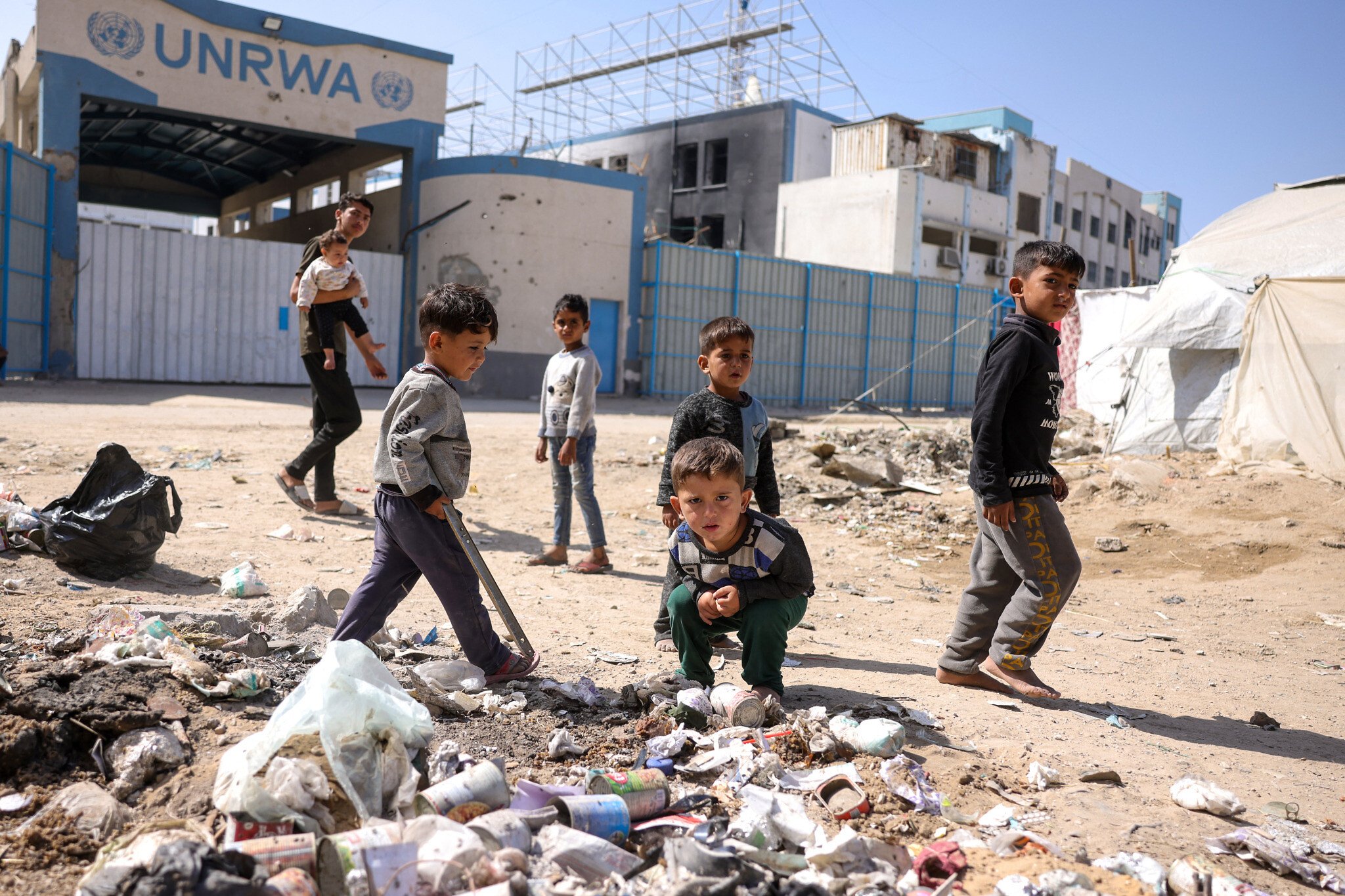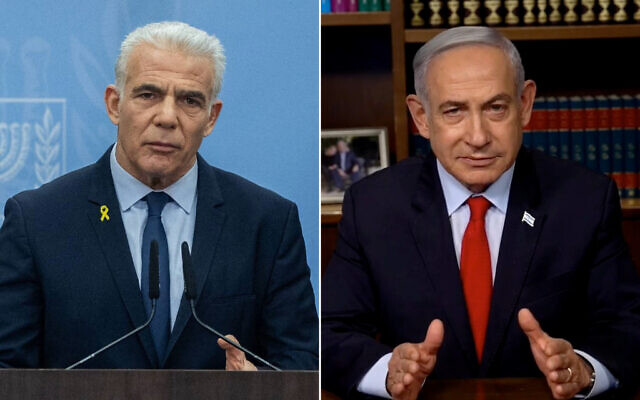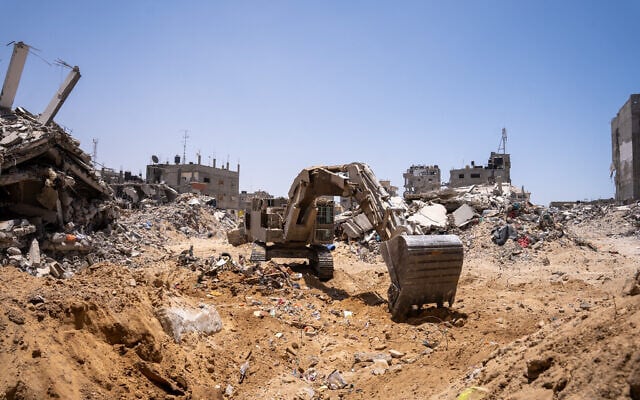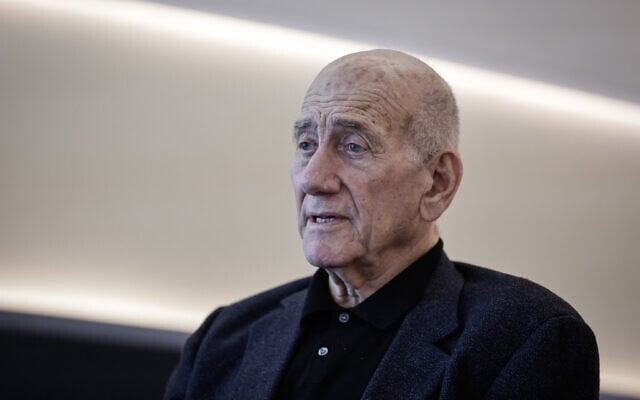



A proposed plan to establish a “humanitarian city” in southern Gaza, in which at least 600,000 Palestinians would be confined, continued to receive backlash from within Israel and abroad on Sunday, with some, including former prime minister Ehud Olmert, alleging that it resembled the Nazi concentration camps built during World War II.
Israeli military leaders had reportedly planned to warn government ministers in a limited security cabinet meeting Sunday night that the ambitious project could take months to implement and imperil ongoing hostage negotiations.
At the meeting, convened at Prime Minister Benjamin Netanyahu’s request, the IDF had been slated to present an outline for the “humanitarian city” centered in Rafah. According to Channel 12, while the military was expected to affirm that it would follow elected officials’ orders, it was also set to sound a note of caution over the plan.
Military officials planned to inform the meeting that the project would “take three to five months from the moment we begin construction until the humanitarian city is operational,” the network reported before the meeting took place, without citing sources.
The plan for the “humanitarian city” was laid out by Defense Minister Israel Katz early last week, and would see Israel build a zone on the ruins of Rafah that would eventually house all of Gaza’s civilians. The zone would first accommodate some 600,000 Gazans living in the Mawasi area on the coast, and then would contain the enclave’s entire population of more than 2 million.
Residents would be screened before entering and would not be allowed to leave, per the plan. International organizations would provide aid while the IDF secures the site from a distance, and residents would be encouraged to “voluntarily emigrate,” according to Katz.

Channel 12 reported that the military brass is worried that proceeding with the humanitarian city could harm hostage and ceasefire talks, which are currently taking place in Qatar.
The outlet attributed that claim to “preliminary discussions in the defense establishment,” where officials are concerned that Hamas may interpret the plan as a signal that Israel intends to resume the war after a proposed 60-day ceasefire. IDF leadership fears, the report said, that the plan would undercut United States guarantees for an end to the war, which could tank the deal.
Netanyahu has publicly promised that Israel would have the option of renewing the fighting if its war goals aren’t achieved via diplomacy during the potential two-month truce.
The IDF was also expected to present additional considerations regarding the project, including its implications for international law as well as logistical issues surrounding sanitization and the provision of medical care.
The military is far from the only source of anxiety about the plan.
In a series of posts on X, Opposition Leader Yair Lapid derided the plan as an expensive fantasy of Netanyahu’s far-right partners, Finance Minister Bezalel Smotrich and National Security Minister Itamar Ben Gvir, who favor the reestablishment of Israeli settlements in Gaza.
Pointing to a headline declaring that the plan would cost up to NIS 15 billion ($4.5 billion), Lapid wrote that the money could be better spent on education or lowering Israel’s cost of living.
“This money won’t come back,” he wrote on Sunday. “Netanyahu is letting Smotrich and Ben Gvir go wild with extreme delusions just so he can maintain his coalition. Instead of wasting the middle class’s money, they should end the war and return the hostages.”
Lapid also tweeted an excerpt from an interview he gave Army Radio in which he called the plan “a bad idea from every possible perspective” and said it would force Israel “to have no choice but to stay in Gaza.”
In that interview, Lapid also said: “What is this ‘humanitarian city? Will it be permitted to exit it? If not, how will this be enforced? There will be 600,000 people with a fence around them. I really don’t like people saying ‘concentration camp’ — there are comparisons that cannot be made — but if people can’t leave, it’s a detention camp, and if people can leave, there is no humanitarian city.”
Going further, Olmert labeled the plan as essentially a concentration camp.
“It is a concentration camp. I am sorry,” Olmert told the British Guardian newspaper in an interview.
“If [the Palestinians] will be deported into the new ‘humanitarian city,’ then you can say that this is part of an ethnic cleansing. It hasn’t yet happened,” Olmert said, calling this “the inevitable interpretation” of the plan.
“When they build a camp where they [plan to] ‘clean’ more than half of Gaza, then the inevitable understanding of the strategy of this [is that] it is not to save [Palestinians]. It is to deport them, to push them and to throw them away. There is no other understanding that I have, at least,” added Olmert, who led the country from 2006 to 2009, later served jail time for corruption, and in recent years has been a staunch critic of Netanyahu.
International leaders also criticized the proposal. Britain’s minister for the Middle East and North Africa, Hamish Falconer, has said he was “appalled” by the idea.
“Palestinian territory must not be reduced,” Falconer wrote on X. “Civilians must be able to return to their communities.”
The West Bank-based Palestinian Authority also castigated the plan, with its foreign ministry saying: “The humanitarian city has nothing to do with humanity.”
That view was echoed by UNRWA, the United Nations agency for Palestinian refugees and their descendants, which Israel accuses of collaborating with Hamas. The agency said the “plan would de-facto create massive concentration camps at the border with Egypt.”
A Palestinian official with knowledge of the ongoing ceasefire talks in Qatar told AFP that Hamas rejected plans to concentrate Palestinians in a small part of the south, viewing it as “preparation for forcibly displacing them to Egypt or other countries.”
The talks with Hamas, which are currently said to be at an impasse, were also on the agenda for Sunday night’s limited security cabinet meeting. Attendees had been due to discuss new IDF withdrawal maps intended for presentation to mediators in Doha. Despite the updated blueprint, Channel 12 reported concern within the political echelon that the new plans may still fall short of producing a breakthrough in negotiations.



